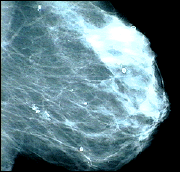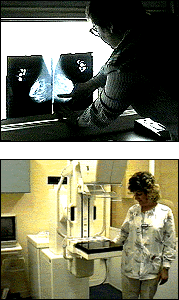
|

|

A mammogram is an X-ray of your breasts. Mammograms can detect an abnormality as early as two years before it can be felt.
A radiologist will review your mammograms looking for densities and irregular breast tissue with finger-like extensions. Sometimes they also see a cluster of microcalcifications, which can be a sign of breast cancer.
The risk of harm from low level radiation used in mammograms is extremely small.
Sometimes abnormal breast changes are not detected by mammograms. Therefore, you should never ignore a lump just because it is not visible on a mammogram. Your mammograms constitute an irreplaceable part of your health history. Being able to compare earlier mammograms with new films helps your local health care provider evaluate areas that may have changed. If you move, take copies of your mammograms with you.
How often you should have a mammogram depends on your age and individual risk of breast cancer.
Most experts believe that women between the ages of 40 to 49 should have a mammogram every 1 to 2 years. There is some controversy about the schedule for this age group and the recommendations may change.
Women over 50 should have mammograms
every year.
Any woman concerned about a change in her
breast should immediately see a health care
provider.
Women with history of breast cancer in their
family should also have special attention relative to their schedule for mammograms.
The dose of radiation used is minimal and should not create a problem for you. In fact, the benefits far outweigh the risks. Having regular mammograms results in earlier detection and decreases your chance of dying from breast cancer.
How much pain will there be with a mammogram?
You may feel some discomfort when your breast is compressed, but it lasts less than a minute of each film. The compression is done to spread the breast tissue so that any potential abnormalities are more easily seen. The better the compression, the less radiation is delivered to the breast. Usually, four films are taken.
Where should I go for a mammogram?
You should have it at a facility that is accredited by the American College of Radiology (ACR). This is something you can determine by calling the American Cancer Society, or by asking about certification when you make your appointment.
Does breast size make a difference?
If your breasts are extremely large, or extremely small, it may take a little bit more time to have a mammogram, but screening is just as accurate.
I have breast implants. Do they affect a mammogram?
It is important to inform the technician that you have implants when you make your appointment for a mammogram. Special techniques are used and some extra films may be required.
If I have breast reconstruction using my own tissue, are mammograms still necessary?
No. If you have had breast reconstruction using your own tissue following a mastectomy, mammograms in your reconstructed breast are not necessary.
I was, like, surprised. No history of any type of cancer even in my family. None. It's just like we die of old age, of natural death, you know. But like I said, I was okay with it and I felt very blessed because it was at the very, very early stages. They couldn't even feel it. It was on the mammogram and it was my first one that I've ever taken.
My doctor had asked me the year before to get a baseline mammogram and I was too busy. I just, I knew everything was okay, I was fine. And of course, you feel around and everything, and you check yourself and ooh, lumps, bumps. Well, she had just checked me. I'm sure she felt those same lumps, bumps. You know, everybody seems so lumpy and bumpy. How do you know which is which? But in 1991, I had gone to my doctor for my physical and she says, "Colleen, did you get your baseline mammogram last year?" And I go, "No I was too busy." And she said, "I'll tell you what. Let's set it up and let's do it." And we made it for my day off. I went in on my day off, I took it. And before I left, I just had a feeling they found something. They took so many and they used a small tray also to get a closer look, and they weren't really alarming to me. I think they found something.
.
The mammograms were no good for me, and you feel helpless when you realize that. This is the biggest advancement in cancer detection, and it didn't work for me. So okay, you feel cheated, you know. This didn't work. I hate those commercials on TV where they say her cancer is this little and it was detected by a mammogram, you know. I had mammograms every year and then I had, I went to different doctors every six months trying to beat this because I knew my mother had it and I knew I was going to get it. It didn't work. Nothing I did worked, so you feel helpless.
I'd advise anybody if they were told to wait and see, immediately go for a second opinion. You don't have to wait until you can feel something, or until you see something. You can get it early now with mammograms where they can get something so deep. They get it taken care of. So if there's something there that's questionable, even on the first mammogram, get a second opinion.
 up to Contents of this Page
up to Contents of this Page

 up to Contents of this Page
up to Contents of this Page
Should I worry about the amount of radiation if I have several mammograms? up to Contents of this Page
up to Contents of this Page
![]() Lottie's experience
Lottie's experience
![]() Colleen's experience
Colleen's experience
![]() Sheila's experience
Sheila's experience
![]() Dorothy's experience
Dorothy's experience
